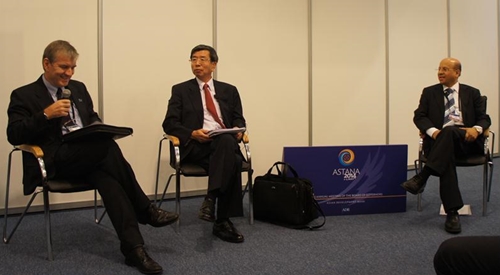Providing SMEs with Sound Credit Assessment is Key to Increase Financial Inclusion: ADB President Nakao

ADB President Takehiko Nakao said that financial inclusion is priority for ADB but the introduction of mobile banking services by commercial banks is insufficient to achieve this goal. Nakao said that proper financial advice should be given to traditional small business units and SMEs so that they may identify risks and opportunities, increase and create jobs, and drive the real economy. He added that the ADB is pursuing its Regional Financial Integration Plan and the ADB Strategy 2020 which both aim to deepen financial inclusion and reduce poverty.
Nakao was responding to a question from UNI Apro on how ADB plans to achieve its goal for inclusive growth. According to the IFC’s findings, 1.5 billion adults in Asia Pacific do not have bank accounts and most SMEs do not receive credit from formal financial institutions
Nakao said that activities such as the ADB Financial Infrastructure Project under the ADB Strategy 2020 have a direct impact on poverty reduction by improving connectivity amongst the population and market accessibility for rural producers. Nakao also said that the bank is focused on improving education, health care, and social safety nets amongst the marginalized population living below the poverty line.
During the ADB President’s meeting with civil society organizations, the GUF delegation expressed concerns over the ADB 2020 strategy where there is weak discussion on inclusive growth deficiencies and the lack of support or adequate safety nets to mitigate extreme inequalities in many country projects funded by ADB loans. These shortcomings were also pointed out by independent evaluators of the ADB strategy.

Later at the Governors’ Seminar on the theme “Reducing Vulnerability: Learning from the Past”, Nakao said that he favored balanced regulations that take into the account the different development stages of financial markets in individual countries instead of a “one size fits all” financial regulation to arrest future crisis.
“Regardless of its level of development, a country will risk being destabilized by a financial shock if its financial system is not well-regulated and when effective macro-prudential measures are absent,” said the ADB President. “To prevent future crises and to protect their gains in poverty reduction, Asian countries must learn from past crises and continue their efforts to strengthen economic fundamentals and financial systems.”
In response to a question from UNI Finance Global Union on whether the United States Banks will comply with the BASLE III guidelines, Marisa Lago, Assistant Secretary for International Markets and Development at the US Department of the Treasury, said that USA banks have already taken steps to comply with the BASLE III guidelines.
UNI LC Japan Finance sector delegation, together with UNI Apro Finance President Maskazu Tahara, Vice President Catherine Jikunan, UNI Finance Head of Department of Uni Finance Marcio Monzane joined the GUF delegation to the 47th ADB AGM held in Astana, Kazakhstan 2-5 May 2014.

